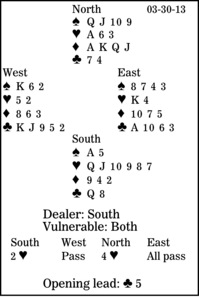Bridge column, March 30: Stop to consider the tricks needed

That is so true -- timing is everything. And it applies to many bridge deals, not just for declarer but also for the defenders. In today's deal, who should come out ahead in four hearts after West leads his fourth-highest club?
South opened with a textbook weak two-bid: a six-card suit containing two of the top three or three of the top five honors, and 6 to 10 high-card points. North jumped to game, hoping his side would not immediately lose four black-suit tricks.
Note West's lead. Fourth-highest applies not only in no-trump but also in a trump contract when you have at least one honor in that suit.
South has four potential losers: one spade, one heart and two clubs. If either major-suit finesse wins, he is safe. Or if he can draw trumps, he might be able to discard his low spade on dummy's fourth diamond.
East, though, should wonder where the defenders can get four tricks. He should hope for two club winners. He can see a trump trick. So his side must take one spade. West will not have the ace and king, because then he would have led the spade ace, not the low club. If West has the spade ace, there will be no problems. But if he has the king, there isn't a moment to lose.
East must win with his club ace and shift to the spade eight (high denying an honor in the suit). Then the contract must fail. No other defense works.
Leading back partner's suit is usually right in no-trump, but much less often in a trump contract.
** ** **
COPYRIGHT: 2013, UNITED FEATURE SYNDICATE
DISTRIBUTED BY UNIVERSAL UCLICK FOR UFS

